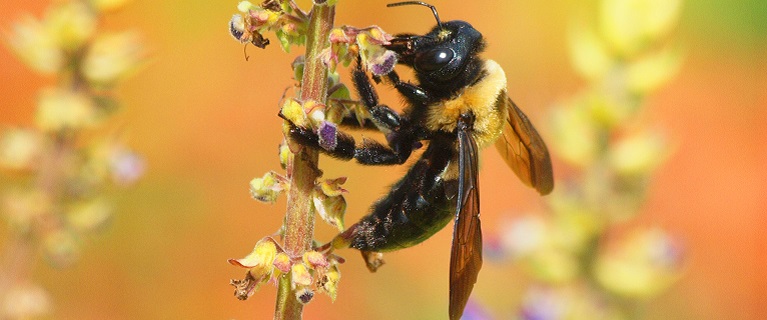By Melanie Friedel, American Forests

You probably know bees as the insects that pollinate flowers or the pests that sting your cousin and ruin your family barbecues every summer, but you might be surprised to hear that they’re not the only things that bees do!
Yes, we need bees to pollinate flowers so that we can grow crops and maintain habitats and food sources for animals and insects. This also helps ensure that plants can be around to provide oxygen, making the world a better place. But it’s rare that we give bees the credit they deserve for providing us with products we use every day.
Honey, of course, is a big one. Bees make honey by collecting nectar from flower blossoms, bringing it back to the hive, chewing it, passing it to other bees who continue to chew it and eventually depositing it into honeycomb once it’s thick enough. While the honey is stored in the honeycomb cell, the bees fan it with their wings until it dries out and becomes stickier. Eventually it reaches our kitchens, sometimes still in the honeycomb! We use it as a natural sweetener in food and drinks, but it also eases sore throats, boosts our immune systems — especially our immunity to local allergens if we eat local honey — and is both an antioxidant and anti-inflammatory. Who knew?
A less common bee byproduct you should know about is propolis. Bees make it by combining sap from plants and trees with beeswax. Different types of plants and trees result in different types of propolis, so bees in different places make varying kinds. Bees use propolis to build their hives, while we use it for medicine. Propolis contains more than 300 compounds, most of which are antioxidants and immune-system boosters. You can find it at pharmacies or health food stores, ranging from liquid sprays for a sore throat to hard candies for a healthy treat. Its many benefits include antibacterial, antiviral, antifungal and anti-inflammatory powers. Use it on your throat, a cut, a swollen ankle, on your skin to soften it and reduce redness, or throw some into your morning coffee or juice!
Most honey bees eat honey, but the queen bee gets something much more prestigious: royal jelly. And we can use it too. Young female worker bees combine pollen with the materials in their glands to produce the jelly, which is full of nutrients and minerals including calcium, iron, potassium and an array of amino acids. Its list of benefits seems endless. Like honey and propolis, it boosts our immune systems and fights seasonal allergies, but it also supports our kidney, pancreas and liver, reduces cholesterol, works as a probiotic supporting all-around health, makes our skin softer, can help heal wounds, prevents Alzheimer’s disease, and might even help with diabetes.
The power of these products is astounding and certainly worth recognizing. We can thank bees for much more than the beautiful flowers they allow us to enjoy, and with all of these benefits, we might even be able to forgive them for the occasional sting. Next time you’re at your local market, give these bee byproducts a shot — you might just find out that nature produces the best medicine of all.